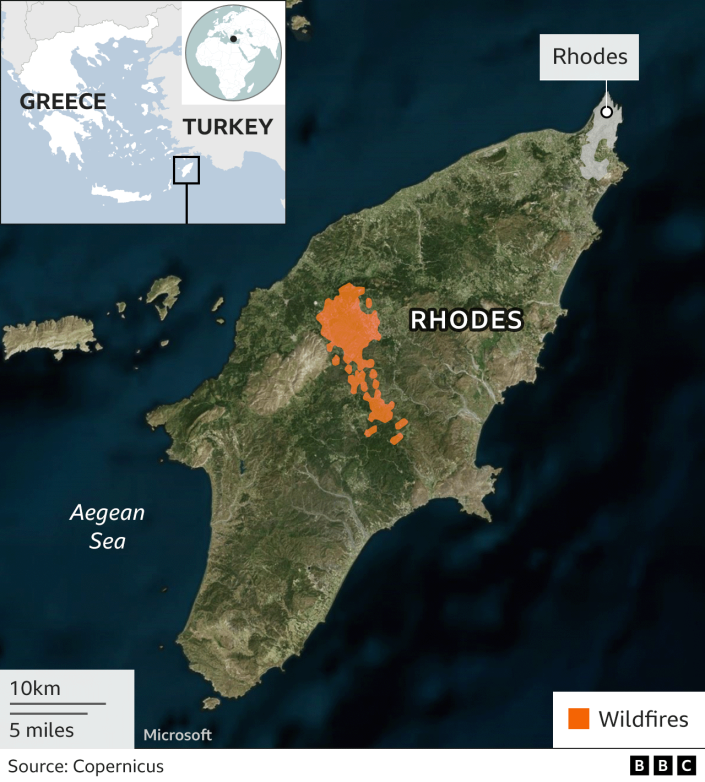Thousands of people have been evacuated from homes and hotels on the Greek island of Rhodes after wildfires engulfed large parts of the island.
The country’s fire service has described the fires as the most difficult it is currently facing.
It is estimated that more than 3,500 people have moved by land and sea to safer locations.
The island has been battling wildfires fanned by strong winds since Tuesday, amidst a heatwave in Europe.
No injuries have been reported, according to the Ministry of Climate Crisis and Civil Protection in Greece.
It said visitors are being evacuated safely from the affected areas of Rhodes – which represent less than 10% of the island’s tourist accommodation – and are being redirected to other hotels on the island.
Five helicopters and 173 firefighters were operating in the area, with three hotels in the Kiotari area reported to have been damaged by fire. The areas of Laerma, Lardos and Asklipio were also affected.
Private boats joined the Greek coast guard in helping to pick up people from beaches on the east of the island. Greek navy vessels were also reported to be heading to the area, which is popular with tourists.
Deputy fire chief Ioannis Artophios said a ferry was available to accommodate people. Others are being housed at an indoor stadium on the island, according to the island’s deputy mayor.
Mr. Artophios added that firefighters often fight on Rhodes because of how green it is, which is what makes it an attractive tourist destination.
Greek television showed long queues of tourists with suitcases being taken to safety, with smoke in the background.
One British woman said she was evacuated from the hotel she was staying at with her sister and daughter, but was then stuck on a beach with hundreds of others in severe heat.
“There’s just a small shack here and there’s so many of us,” Becky Mulligan told the BBC. “There’s children, it’s the middle of the day, we are just stuck here with no help, it’s disgusting.”
Katie Piercefield-Holmes, who arrived on the island on Thursday, described the situation as “chaotic”.
“Today was normal up until about lunchtime when the sky turned orange. It was like a sunset in the middle of the day,” she told the BBC.
“Hundreds of people were filing down to the beach asking for water, wet towels, but we were being told to stay at that point.”
She says firefighters have told her she is safe in her hotel, despite other guests evacuating.
Simon Wheatley said ash had begun falling onto his pizza when he was eating.
“The hotel said this was normal and there was no need to worry as they were in contact with the authorities about the situation,” he told the BBC.
His hotel was later evacuated.
“We saw that a beach bar that we were at just the day before had burnt down. The smoke was so bad. We had to leave two bags of luggage.”

Travel company TUI said a small number of its hotels had been affected and it was relocating customers to alternative accommodation as a precaution.
Jet2 also said he was aware of the situation in Rhodes and was asking customers to follow local guidance.
Rhodes deputy mayor Konstantinos Taraslias said a change of winds on Saturday morning helped the fire grow bigger and reach tourist areas.
Since breaking out in a mountainous area on Tuesday, the fire has scorched swathes of forest.
Firefighters from Slovakia arrived in Rhodes on Saturday to help local teams battling the fires.
“The situation in Rhodes is serious and extremely difficult. Due to the strong wind and quickly changing direction of the fire, firefighters had to withdraw and move,” Slovak Fire and Rescue Services posted on Facebook.
Greece is facing further intense heat this weekend, with meteorologists warning that temperatures could climb to as high as 45C (113F).
It could turn into Greece’s hottest July weekend in 50 years, one of the country’s top meteorologists has said.
Firefighters are continuing to battle dozens of wildfires across the country. An area west of Athens is among the worst-hit areas, along with Laconia in the southern Peloponnese and the island of Rhodes.
And authorities are warning of a very high risk of new blazes as the heat continues to rise.
People have been advised to stay home, and tourist sites – including Athens’ ancient Acropolis – will be shut during the hottest parts of the next two days.
Greece – like a number of other European countries – saw a prolonged spell of extreme heat earlier this month.
The latest heatwave comes at one of the busiest times for the country’s tourism industry.

Are you in the area? Have you been affected by the fires in Rhodes? If it’s safe to do so, you can share your experiences by e-mailing [email protected].
Please include a contact number if you are willing to speak to a BBC journalist. You can also get in touch in the following ways:
If you are reading this page and can’t see the form you will need to visit the mobile version of the BBC website to submit your question or comment or you can email us at [email protected]. Please include your name, age and location with any submission.
